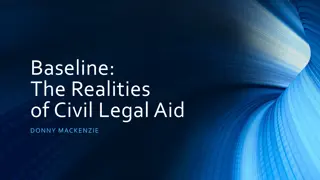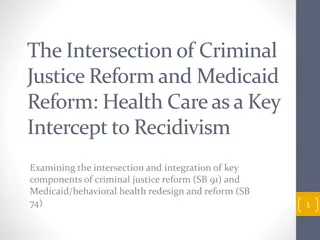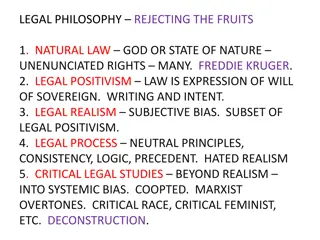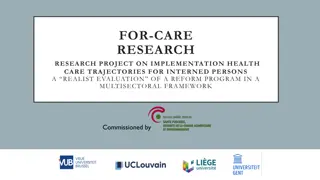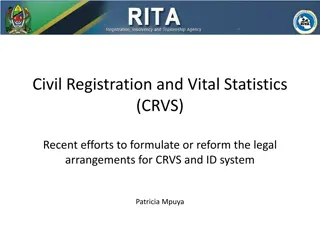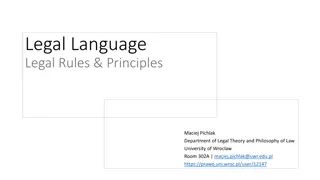Legal Research and Reform
Legal research involves learning and understanding the law, finding primary and secondary sources, and utilizing various resources like printed books and legal websites. Legal reform, on the other hand, focuses on examining existing laws, advocating for changes, and enhancing justice and efficiency in the legal system.
Download Presentation

Please find below an Image/Link to download the presentation.
The content on the website is provided AS IS for your information and personal use only. It may not be sold, licensed, or shared on other websites without obtaining consent from the author.If you encounter any issues during the download, it is possible that the publisher has removed the file from their server.
You are allowed to download the files provided on this website for personal or commercial use, subject to the condition that they are used lawfully. All files are the property of their respective owners.
The content on the website is provided AS IS for your information and personal use only. It may not be sold, licensed, or shared on other websites without obtaining consent from the author.
E N D
Presentation Transcript
LEGAL RESEARCH LEGAL RESEARCH AND AND LEGAL REFORM LEGAL REFORM ... ...
legal research legal research What is Legal Research? Learning and understanding of the law. How is Legal Research done? Identifying and retrieving necessary information to support legal decision making In clearer terms, it includes steps, a)beginning from analysis of facts of a problem and b)ends with the application and communication of the result of legal investigation.
Finding primary sources of law.(e.g. cases, statutes, provisions) Three Three steps of steps of legal legal research research Finding secondary authority about legal topics.(e.g. legal dictionaries, law reviews, etc.) Searching non-legal sources, for supportive information
What are the Sources of legal What are the Sources of legal research ? research ? Printed books Law libraries Legal research websites and databases Law schools and colleges Law firms and other research environments. Who Who does legal research ? does legal research ? Can be performed by anyone who needs legal information. Includes lawyers, law students, law librarians, paralegals
What can the What can the legal fraternity legal fraternity research about research about ? ? Legal reform report for improvising the law Case laws Meaning of any legal word or maxim Content of the speeches Legislative intent of any Act(can be found on the Bill passed) Parliamentary debates
Law reform Law reform Reform: [Latin: reformo] Improvement or amendment of what is wrong, corrupt or unsatisfactory. What is law reform? (also referred as legal reform) Examining existing laws Advocating and implementing changes in legal system
Why legal reforms ? Why legal reforms ? Enhancing justice and efficiency. Law of a country cannot remain static. Must keep abreast with the rising social, political, cultural and legal changes of a country. Who felicitates legal reforms ? Who felicitates legal reforms ? Law Reform Bodies OR Law Commissions set up by the government but are intellectually independent This is done to accurately reflect on how the law should progress They carry out research in order to simplify and modernize law.
Who felicitates legal reforms in Who felicitates legal reforms in India? India? Law commission of India is the executive body which works for legal reforms in India. Recommendations of law commission of India are not binding on the government of India. The suggested legal reform report can be accepted OR rejected.
How can law be reformed ? How can law be reformed ? Repeal Four methods for reforming the Law are practiced Consolidate Create Codification
Repeal: Complete removal OR replacement of a law. Consolidate: Combination of number of Acts of Parliament into one codifying statute. Create: Creation of a completely new law. Consolidate: Collecting and restating the law of a jurisdiction in certain area, followed by forming a codex(book of codes) of law.
Legal Research and Legal Legal Research and Legal Reform Reform There are many components of legal reform. Legal research contributes as an important component. In accordance with the law reform, this research depends on several factors: Body/Institution taking the project of law reform Subject matter of the reform Time allowed for submitting the report of legal reform.
limitations limitations Research in general is limitless i.e. it is a deep exploration of a particular topic. But when research is a part of a law reform it is; Undertaken with a definite end Done to formulate proposals regarding improvising law in precise terms Because of this, research is to be moulded in a particular direction Thus, research under legal reform is considered with limitations
Legal research for the purpose of Legal research for the purpose of law reform has 3 main categories law reform has 3 main categories Comparative Historical Analytical
Analytical Research: Analytical Research: Primarily aims at exploration about the existing law. e.g. if consists of statutes, research would mean finding relevant statutes. Qualitative inquiry, since it has content-bound generalizations. Involves critical thinking. Evaluation of facts of law which is to be reformed. Critical details can be added to the law reform report through this type of report.
Historical research: Historical research: Deals with finding out the previous law in order to understand the existing law. Studies course of evolution of existing law. Why is this research important? As present law raises meaningful queries, it becomes necessary to explore the circumstances through which the present law was enforced. It comes to the researcher, while doing Historical research, that attempt to reform the current law was thought of in the past too, but was rejected for valid reasons.
Comparative research: Comparative research: Involves comparisons of legal doctrines, legislation and foreign laws. Studies how law acts differently in different settings of social and cultural character. Thus, helps in amending and modernizing the law. The practical problem that a researcher faces, is which countries are to be chosen for comparison.
Conclusion: Conclusion: It can be concluded that, Legal Research in a systematic yet limited manner is a necessary component of Legal Reform. In order to improvise and advance the law of our country, it is always beneficial to consider Legal Reforms. MANVA KHOJARE [1st year, BALLB] (khojare.manva@gmail.com)







